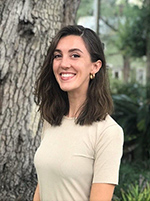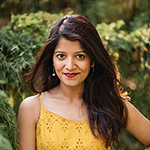 Poetry Editorial Board member David Eso talks with the 2023 Open Season Poetry Award winner about the value of a trusted first reader, the telescoping of time, and the geographic, mythological, religious, and cultural landscapes of home in her poem, "Interview with a Cervidologist."
Poetry Editorial Board member David Eso talks with the 2023 Open Season Poetry Award winner about the value of a trusted first reader, the telescoping of time, and the geographic, mythological, religious, and cultural landscapes of home in her poem, "Interview with a Cervidologist."
DE: Your poem’s literary and animalistic surfaces play out against a political backdrop—namely, recent changes to abortion laws in the United States and Georgia House Bill 48 (which you reference). Why did you choose to make deer central to this politically charged poem?
CHN:
The moment that comes to mind is when I found the poem’s ending point. I came across a Northern Wilds article from 2015, in which there was a quote by the author-hunter Shawn Perich: “Maybe Sigmund Freud, were he a deer hunter, would have an explanation. Perhaps, by going inside a dark box, the modern deer hunter re-enters the womb.” A hunter’s dark romanticization of the body he came from as synonymous with the body he hunts, as well as the implications of a fraught character like Freud, brought all of these political anxieties to the surface. The animal fear that myself and loved ones have felt in this political landscape suddenly had a body.
Read the rest of Caroline Harper New's interview.
Deepa Rajagopalan, Open Season Fiction Award winner
 Volunteer Anne Hung talks with the 2023 Open Season Fiction Award winner about truth telling in fiction, finding ways to hold beauty, and how our experiences shape the way we respond to powerlessness in her story, "Cake."
Volunteer Anne Hung talks with the 2023 Open Season Fiction Award winner about truth telling in fiction, finding ways to hold beauty, and how our experiences shape the way we respond to powerlessness in her story, "Cake."
AH: “Cake,” similar to another of your award-winning stories “Peacocks of Instagram,” provides an intimate look into the protagonist’s life, thoughts, and feelings as an immigrant worker experiencing discrimination and fighting to survive. Can you speak to these parallels and how your writing has evolved between these two stories?
DR:
I am fascinated by power. Who has it? Who doesn’t? Who gets to claim theirs? How do our experiences shape how we respond to being powerless?
When I started to write “Cake,” I was thinking about the MeToo movement, and the ways in which power is taken from women. A large portion of the MeToo conversation was geared towards celebrities, but I wanted to talk about it in the context of someone who has a lot less privilege. Rania’s environment presents her with a number of disadvantages. She’s a woman. She’s poor. She works as a housekeeper. She’s also an immigrant though that is not explicitly said in the story. She loses a job opportunity to Jasper, someone way less qualified than her because he was a privileged man. We see this all the time. But what she does from there, how she navigates that landscape, what it means for her to feel safe, these are the things I wanted to talk about.
Read the rest of Deepa Rajagopalan's interview.